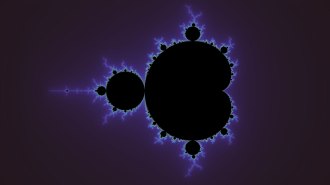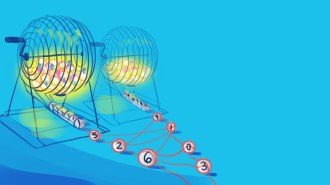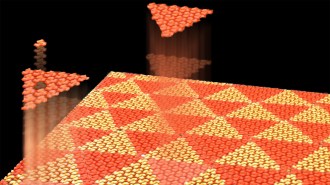“. . . it may happen that small differences in the initial conditions produce very great ones in the final phenomena. A small error in the former will produce an enormous error in the latter. Prediction becomes impossible, and we have the fortuitous phenomenon.”

French mathematician Jules Henri Poincaré (1854–1912) made this observation in his 1908 essay “Science and Method.” This remarkable insight aptly encapsulates a key feature of nonlinear dynamics (or what many people call, more loosely, “chaos” theory).
Sensitive dependence on initial conditions is a feature of the motion of three or more bodies that interact gravitationally. In the solar system, objects such as asteroids and comets, can follow chaotic trajectories, abruptly and unpredictably shifting their orbits from time to time. Numerical computations can pin down their paths only up to some finite time. The distant future remains clouded.
These chaotic trajectories are particularly apparent in a three-body system in which the mass of one body is so small that it doesn’t influence the motion of the other two bodies. In such a “restricted” three-body system, the motion of the nearly massless object is typically erratic. An asteroid tugged by Jupiter and the sun falls into this category, as does a spacecraft under the influence of Earth and sun.
Intriguingly, the same sort of uncertainty arises in atomic and molecular systems, particularly for the motion of electrons that have been excited to high energies. In effect, these so-called Rydberg electrons “orbit” at large distances from their parent atoms.
“We now know that chaotic trajectories identical to those that govern the motion of comets, asteroids, and spacecraft are traversed on the atomic scale by highly excited Rydberg electrons,” Mason Porter and Predrag Cvitanović remark in the October Notices of the American Mathematical Society.
Indeed, the mathematics describing the motion of gravitationally interacting bodies in space closely parallels the mathematics describing the motion of the smallest particles of atomic and molecular physics. As it happens, the special case of the celestial restricted three-body problem is mathematically analogous to the situation when a hydrogen atom loses its electron (via ionization) in crossed electric and magnetic fields.
In celestial mechanics, understanding the nature of chaotic trajectories is important for predicting what could happen to populations of small celestial bodies, such as near-Earth asteroids that could threaten the planet, and for designing gravitationally assisted transport of spacecraft. In the case of spacecraft, the tangle of gravitational forces creates tubular “highways” in space along which these vehicles can proceed with little expenditure of energy (see “Navigating Celestial Currents” at Navigating Celestial Currents).
Atomic physicists and chemists face a similar challenge in modeling chemical reactions and computing ionization rates of atoms and molecules. Among the tools that they have developed to do such calculations is “transition state theory.”
Roughly speaking, transition states are barriers the must be crossed, from starting materials to products, for chemical reactions to occur. Understanding the geometry of these multidimensional barriers provides insights into how chemical reactions occur. So, using the paraphernalia of the theory, researchers can describe how a set of “reactants” evolves into a set of “products.”
The same sort of transition occurs in the celestial realm. For example, the comet Oterma switches, every once in a while, from a complex trajectory outside the orbit of Jupiter to one lying within Jupiter’s orbit. To make this transition, the comet must pass through a bottleneck near two of Jupiter’s libration points—points in space where objects maintain a fixed distance relative to the planet and the sun. As shown by Caltech mathematician Jerrold Marsden and his coworkers, the transition between the orbits is mathematically analogous to a boundary between initial and final states.
“Such unanticipated connections between microscopic and celestial phenomena are not only intellectually gratifying but also have practical engineering applications in the aerospace and chemical industries,” Porter and Cvitanović write.
So, theory from atomic and molecular physics can be used on a much grander, celestial scale, and celestial mechanics can provide insights into atomic and molecular interactions. “The orbits used to design space missions thus also determine the ionization rates of atoms and chemical-reaction rates of molecules!” Porter and Cvitanović declare.
One example of the value of this connection has been NASA’s Genesis mission, which was designed to collect samples of the solar wind. In an interdisciplinary effort, Caltech’s Martin W. Lo worked with mathematician Jerrold Marsden, Georgia Tech physicist Turgay Uzer, West Virginia University chemist Charles Jaffé, and others to design the complex, unstable trajectory that the Genesis spacecraft required to accomplish its mission.
It’s a marriage made in the heavens.






